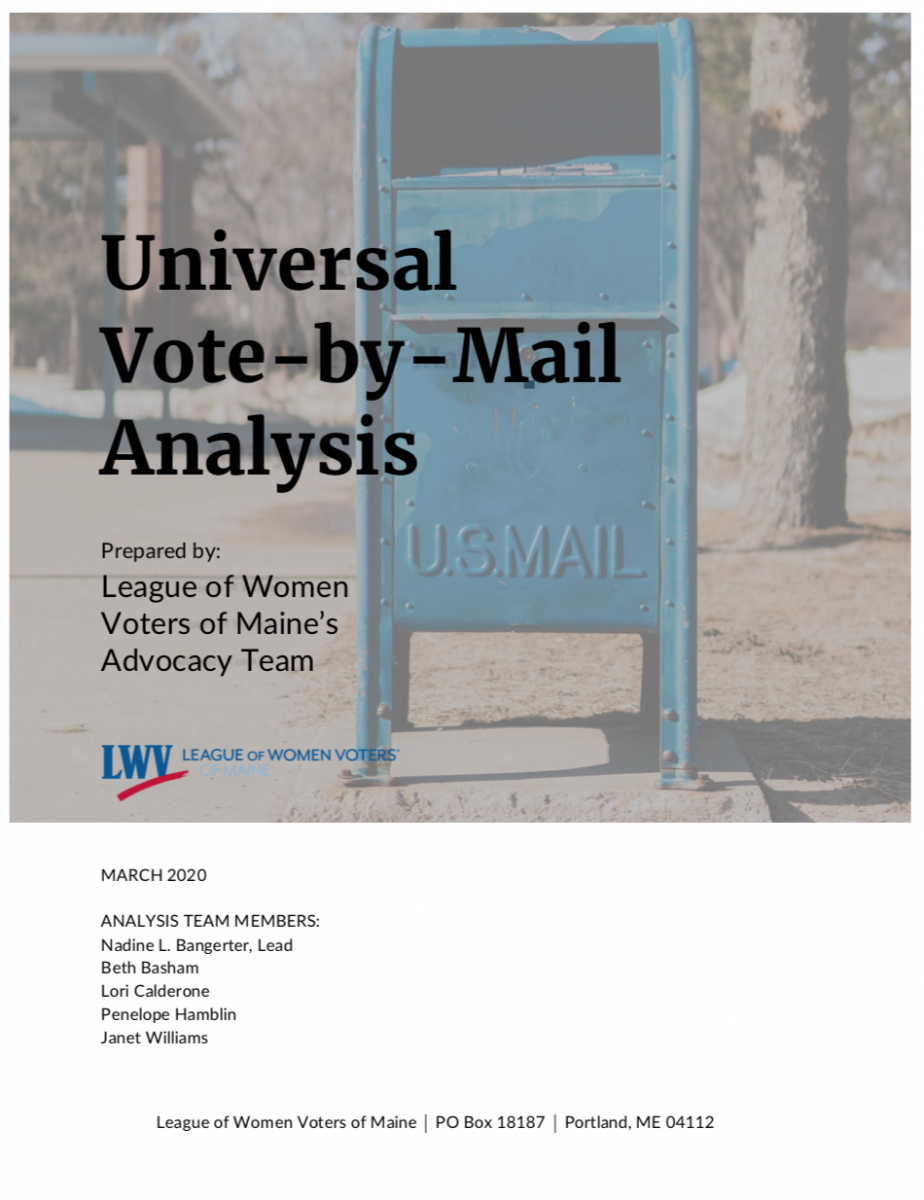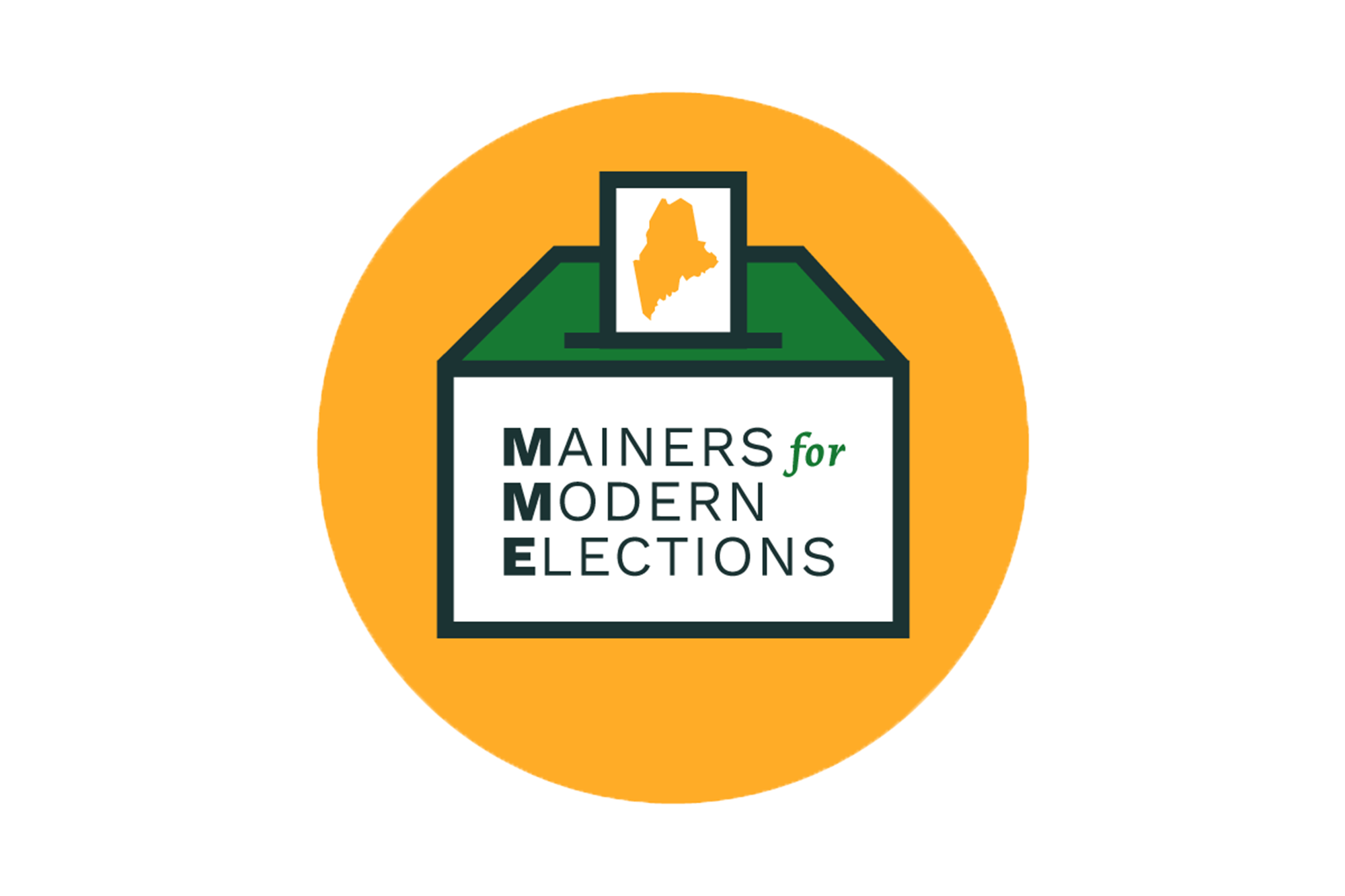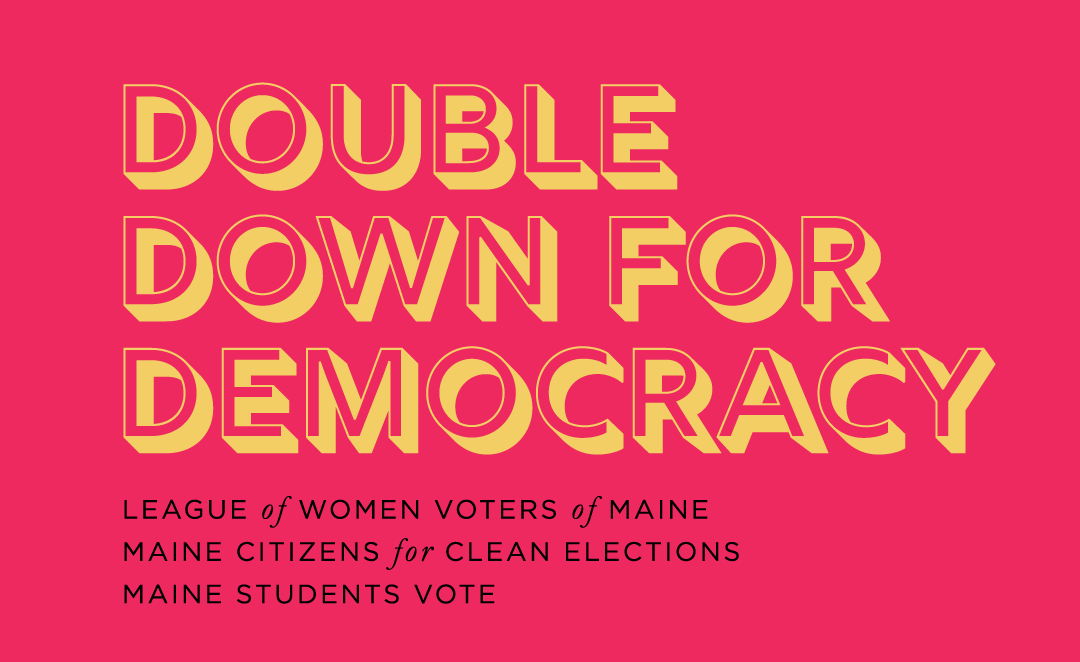Introduction
The League of Women Voters of Maine works year-in, year-out to protect voter rights and expand access to the ballot. Our leadership has helped to make Maine one the most pro-voter states in the country. Critical voter protections include:
Same-day Voter Registration (SVR): any eligible voter may register at the polls on Election Day and cast a standard (non-challenged) ballot then and there.
We have been promoting and defending SDR for decades, and successfully opposed campaigns to roll it back.
No photo I.D. required to vote: Maine is one of 16 states that does not require a picture I.D. or proof of citizenship to vote at the polls on Election Day.
Bills to require photo I.D. are introduced every year. We have opposed and helped to defeat them every time.
No felony disenfranchisement: Maine is one of only two states that does not deny voting rights to those convicted of crimes.
Working together:
Democracy Maine was the founding convener of Mainers for Modern Elections and remains a leader within that coalition. Mainers for Modern Elections is a coalition that is committed to ensuring that our right to vote safely transcends politics and partisanship. We advocate for safe, secure, modern elections. Our coalition is committed to securing equitable access to the ballot for every eligible Maine voter.
_____________
Related links:
Automatic Voter Registration
The League of Women Voters of Maine, together with our national affiliate and sister Leagues across the country, support new mechanisms to assist in voter registration, including automatic voter registration (AVR).
AVR is a secure and efficient process that improves the timeliness and accuracy of our voter rolls. The system registers eligible citizens to vote when they get or renew a driver's license or change their address with the Bureau of Motor Vehicles. Eligible citizens will also be registered when the interact with other state agencies where they are already asked to provide proof of eligibility to vote: identity, address, citizenship, and signature.
The League of Women Voters of Oregon, California, Alaska, and Connecticut, among others, were part of the coalitions driving AVR forward in their states, paying close attention to bill language to ensure that the new systems of registration did not negatively impact underrepresented communities. We support provisions and safeguards to ensure that all eligible Americans can participate in AVR and that those who are not eligible to vote are not wrongly brought into the system by government action.
AVR laws have now been passed in 17 states and the District of Columbia.
Next Steps:
In 2019, the Maine State Legislature passed an Automatic Voter Registration bill. Until the bill is fully implemented, individuals wishing to vote will still need to complete a voter registration card. The State of Maine Voter Guide describes eligibility requirements and explains how to complete a voter registration application.
The first portion of the new law took effect January 1, 2020, and allows eligible 16- and 17-year-olds to pre-register to vote (expanded from previous law, which allowed 17-year-olds to pre-register). They can register at their town office or city hall, through any Bureau of Motor Vehicles branch office, in most state and federal social service agencies, or at voter registration drives. They will not be able to vote until their 18th birthday, except that they can vote in a primary election if they will be 18 by the time of the general election. Otherwise their pre-registration will automatically take effect on their 18th birthday. (Like all voters, teens must update their address if they have moved since registering.)
The new Automatic Voter Registration law was fully implemented during the summer of 2022. Under the new law, unless voters opt out, they will automatically be registered to vote when they receive or renew their drivers' licenses at the Bureau of Motor Vehicles and/or when they apply for or renew their eligibility for MaineCare. Eventually this may extend to other state agencies. The League of Women Voters of Maine closely followed the progress of this significant step toward our ambitious goal of 100% registration of eligible voters.
Benefits of AVR:
AVR is a straightforward idea. It's a process for registering voters at the time eligible individuals interact with state agencies like the Bureau of Motor Vehicles, while also giving them the opportunity to opt out or enroll in a party.
ACCESSIBILITY: AVR makes voting accessible for more Mainers who can sometimes find it a challenge to keep their registration updated--members of the military, people with disabilities, and senior citizens, among others
ENGAGEMENT: Up-to-date addresses help ensure that candidates for office can connect with voters and constituents to share their vision and learn about issues of concern to the community.
SECURITY: AVR safeguards our voter rolls and helps ensure that all registration records are accurate and up-to-date so that our elections are free and fair.
ACCURACY: AVR helps keep the voter rolls up to date with the most accurate information for eligible voters. It rids the rolls of errors and inaccuracies encountered by voters, advocates and campaigns each year.
EFFICIENCY: By replacing our outdated paper-based system with a modern, electronic one, we can eliminate wasteful red tape and save taxpayer moeny. AVR can also improve efficiency at polling places on Election Day by reducing reliance on same-day registration.
_____________
Related links:
Early Voting
Don't we already have that? Actually, we don't. Not really. What we sometimes hear called "early voting" is really in-person absentee voting. Early voting is different because, unlike in-person absentee voting, ballots are cast immediately - not put aside to be cast by a clerk on Election Day. With true early voting, the voter casts their own ballot into the ballot box or optical scanning machine when they vote before Election Day.
Who supports it? This legislation has been supported by the League of Women Voters, the ACLU of Maine, the Disability Rights Center, the Maine Women's Coalition, Speaking Up for Us of Maine, and many others.
In its 2013 session, the The Maine Legislature narrowly rejected LD 156, a constitutional amendment to establish an option for for early voting. Similar legislation was considered again in 2015, 2017, and 2019, but because it requires a constitutional amendment, it requires 2/3 approval from both the House and the Senate. We have not yet been able to clear that high bar.
It's time for true Early Voting to come to Maine. Let's try again.
Benefits:
- Early voting reduces congestion on Election Day
- It helps eliminate long lines at the polls
- It reduces pressure on election officials
- It provides an important convenience to many voters
- It contributes to a more secure and orderly process for the conduct of elections
More Background:
For the last few years, voting rights have been under attack all around the country. But here in Maine we've fought back. On February 5, 2013, the Commission to Study the Conduct of Elections in Maine released the report of its findings, and we're excited for a whole host of reasons. The Commission not only rejected voter ID, it also endorsed same-day voter registration and early voting! You can read the full report here.
Eight public hearings were held from August through November and members of the League of Women Voters attended every single one of them. Over and over again, Maine voters testified in opposition to voter ID and in support of same day voter registration and early voting. We worked tirelessly to publicize the hearings in local communities, and you responded.
As exciting as this news is, however, we do not agree with everything in the report, including a recommendation to tighten residency requirements for voting. This could discourage young people who attend college here from voting, and it continues a recent trend of attacks on student voting rights. We will work to forestall these proposals.
_____________
Related links:
Online Voter Registration
In 2021, Online Voter Registration was passed and signed into law!
Janet Mills signed several vital democracy reform and modernization bills into law, making permanent policies that were put into place for the 2020 election and taking additional steps to modernize elections in the state. Maine joined 40 other states in allowing eligible Maine residents to register online to vote, and strengthened its absentee voting system so that absentee voting is available to more Mainers going forward. Together, the bills represent crucial updates to Maine’s elections systems and make it easier for all eligible Maine voters to cast a ballot.
The need for OVR has been pinpointed by the COVID-19 pandemic, which closed town offices for months, delaying the processing of voter registration applications for the 2020 election. Implementing OVR would save the cost of printing, scanning, and processing hundreds of thousands of voter registration forms each year. Time-consuming errors — common in handwritten forms — would be drastically reduced.
For more information:How OVR works in other states
_____________
Related links:
Vote-by-Mail

Universal Vote-by-Mail Analysis
In an analysis of all-mail elections (also known as Universal Vote by Mail), our Advocacy Team identified best practices to ensure that no voter is left behind. We hope that our conclusions will help inform thinking about how best to guarantee secure, accessible, and accurate elections.
Introduction:
In late Fall 2019, The League of Women Voters of Maine began an analysis of Universal Vote by Mail (UVBM) as an election method for use in Maine. LWVME’s position on issues is determined by member consensus. In the absence of a stand-alone position on UVBM, the League testified Neither For Nor Against Vote-by-Mail legislation introduced in the first session of the 129th Legislature. Interest in UVBM has been trending nationally, and we anticipate that UVBM will be reintroduced in future Legislative sessions. We began this analysis to determine whether current League positions provide a sufficient basis on which to take a stand for or against UVBM for Maine. We have gathered evidence on the pros and cons of UVBM as it has been implemented in other states. We compared these implementations to the current system of elections in Maine, and made informed estimates of UVBM’s potential impact on voter participation, election security, and administrative costs.
The League’s analysis of UVBM is timely. Although we couldn’t have known it when we began our analysis, the coronavirus has become a public health crisis which has dramatically impacted almost every part of life in America, voting included. The recommendations for social distancing to slow the spread of the virus have led to renewed calls for expanded absentee voting and UVBM.
On March 17th, the Maine Legislature voted to temporarily give Governor Janet Mills more power over elections, saying she can take “any reasonable administrative actions” to ensure as many voters as possible are able to participate in the June 9 primaries — including an expansion of absentee voting.
Absentee voting and voting by mail are important parts of ensuring access to voting while keeping people safe during this pandemic, but it isn’t the only solution. We also need to keep polling places open for voters who need them. We can do this in ways that protect both poll workers and voters who chose to vote in person.
We must continue to ensure that elections are administered fairly and in a way that protects access to voting for every eligible American. It is critically important that our leaders work together during this challenging time to ensure that online portals to request absentee ballots are accurate and modern, and that we have the technology and human resources in place to handle a higher volume of absentee ballots and also allow for hygienic drop off locations. We also urge policy makers to not make permanent changes to our elections that limit voter choices, and which may make our elections weaker in the long run.
Conclusions and Recommendations:
In reaching our conclusions, we faced a dilemma. Universal Vote by Mail is promoted as a system that offers maximum convenience and accessibility to voters. However, under normal circumstances, UVBM by its very nature could limit choices on how to vote and reduce civic engagement by eliminating Election Day activities at the polls. Despite new ballot-tracking technologies, there are legitimate security concerns about the delivery, marking, and return of ballots unsupervised by election officials. These concerns apply to absentee voting as well as UVBM, but to the extent that UVBM multiplies the number of absentee ballots, it multiplies the risks.
Beyond voter access in an emergency, the benefits of UVBM are harder to gauge. Voter turnout is hard to measure as it is not only a fluid process, impacted by election cycles, demographics, and political climates; but it also cannot easily be attributed to UVBM. Most states have implemented UVBM in partnership with other highly effective methods that Maine has already adopted or can adopt without UVBM. Further academic study of the impact of UVBM on voter turnout is needed. According to our calculations, UVBM would not save money for Maine, given the high cost of printing, preparing, and mailing ballot packets to every voter, signature verification, and counting returned ballots. Best practices for UVBM, including a more centralized and automated process, would likely be more costly.
_____________






